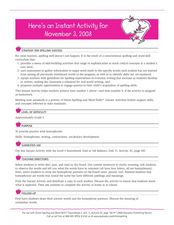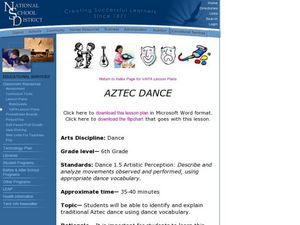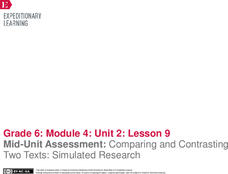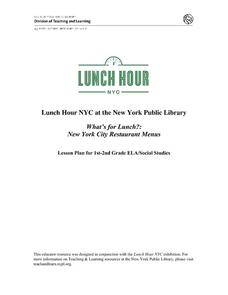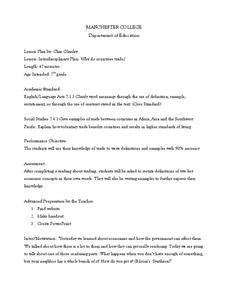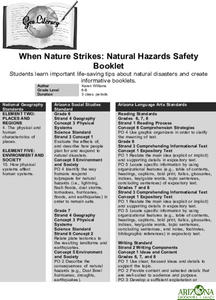Curated OER
Spelling: Homophone Review
Third graders practice using homophones. In this homophones lesson, 3rd graders review what makes a word a homophone and use clues to complete a worksheet that requires them to write in the correct homophone.
Curated OER
Sounding out fluency, Relay Race
Learners practice reading. In this fluency building lesson plan, students participate in a relay race to quickly sound and read word cards. They work in small groups to accurately sound out and say three word cards before it is another...
Curated OER
Whose Voice Do I Hear?
Fifth graders examine the power of voice in writing by completing a story using words following a particular voice. They take simple nursery rhymes, then attempt to put their own voice to a revised version. An interesting lesson on writing!
Curated OER
Gearing up for Grammar
Students input autobiographical information to apply in a Diamante' poem that utilizes the different parts of speech. Students interact with each other sharing their autobiographical information completed on the database created....
Curated OER
Exponents
Sixth graders explore mathematics by participating in a SMART Board activity. In this exponents lesson plan, 6th graders identify the different exponential powers of a number and discuss how the power of the number accumulates. Students...
Curated OER
Aztec Dance
Seventh graders study Aztec dance to learn about their culture and civilization. In this Aztec study lesson, 7th graders watch a video of Aztec dancers and describe the dance on an index card. Students visit a website to learn the...
Curated OER
How Sharp Is Your Memory?
Students play a memory game as they explore reasoning. In this algebra lesson, students identify concepts using pictures and words. They model real life scenarios using hands on manipulatives.
Curated OER
Synecdoche vs. Metonymy: Definitions
Ask your class to lend their ears, and eyes, to a short video that defines and offers examples of synecdoche and metonymy. Whether it be brand names like Kleenex® and Band-aids® that have come to stand for all the products in a category,...
Curated OER
Antonym Comparison of Animals and Me
Young scholars explore the purpose of antonyms. In this language arts lesson, students create a list of words to describe animals. Young scholars use the list to generate antonyms for each descriptive word.
Curated OER
Context Clues Lesson Plan
Students are introduced to four strategies of context clues. While reading, they use all four strategies in different sections of the reading to determine the meaning of words they are unfamiliar with. To end the lesson, they share new...
Curated OER
Haunting of Third Grade
Third graders discuss the meaning of the word "haunted." They watch as the teacher demonstrates using a sticky note to mark words that they find interesting in their reading. Students read chorally, then break into groups for a...
Curated OER
Black Bayou Lake Short Story
Tenth graders use Microsoft Word to create an original short story. The setting must be Black Bayou Lake National Wildlife Refuge. The characters must be animals found at Black Bayou Lake National Wildlife Refuge. The story must contain...
Curated OER
Fundamentalism
Eighth graders explore the historical roots of fundamentalism and determine whether fundamentalism is a religion or a political ideology. They will examine different religious fundamentalist movements around the world noting any...
Curated OER
Beginning With Writing
Students brainstorm what it means to "convey ideas in writing" They review the standard graphic clarify vocabulary and Discuss the importance of having a standard definition for writing and making sure everyone is in agreement of that...
EngageNY
Mid-Unit Assessment: Comparing and Contrasting Two Texts: Simulated Research
Shoo fly. Scholars read DDT Spray Scares Mosquitoes Away, Study Finds and You Think You Have It Tough? to complete a mid-unit assessment. The learners compare and contrast author presentation and conduct a credibility check on each...
Curated OER
Noisy Nora, Studious Students: Story Elements
Alliterative adjective nicknames generate stories inspired by Rosemary Wells' book Noisy Nora (also a thematic complement to any class with children who make a ruckus to get attention). Class members explore basic story elements --...
Curated OER
Vocabulary/Reading Lesson for Students with Severe Intellectual Disabilities
Here is a great little reading and vocabulary development lesson created just for learners with special needs. The lesson is constructed with both core content and necessary adaptations in mind. The group will use PECS, pointing/gesture,...
Curated OER
Analyzing Literary Devices
Eighth graders identify figurative language and poetry in this literary analysis lesson. Using Through the Looking Glass by Lewis Carroll and a YouTube video for "The Walrus and the Carpenter," young readers complete a literary device...
New York Public Library
What's for Lunch?: New York City Restaurant Menus
Do you remember the days when a cup of coffee cost five cents? At A.W. Dennett restaurant in 1894, you could buy a five-cent cup of coffee and as well as a five-cent slice of pie to accompany it. The menu from that year is a primary...
For the Teachers
Cause and Effect Matrix
Study cause and effect in both literature and informational text with a lesson designed for several different reading levels. After kids review the concept of cause and effect, they read an article or story and note the causes and...
University of California
Impact of the California Missions on Native Americans
While the Spanish claimed to bring civilization to California indigenous peoples, in reality, they also brought violence and forced assimilation to European values. Primary sources, such as the reports of Catholic priests and Europeans...
Curated OER
Why Do Countries Trade?
Seventh graders read about countries trading and then write definitions and examples of trading concepts they read about. In this trading lesson plan, 7th graders visit a website to read about trading.
Curated OER
When Nature Strikes: Natural Hazards Safety
Middle schoolers observe the impact of natural disasters on humans, and become aware of the dangers of environmental hazards such as flash floods, tornadoes, and hurricanes.
Curated OER
Review of Literary Devices
Sixth graders review literary devices. They use both fiction and nonfiction texts to review metaphor, simile, alliteration, imagery, symbolism and personification. This lesson has a scripted guide for the teacher to follow.


